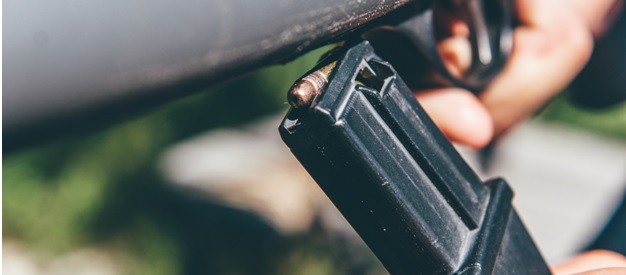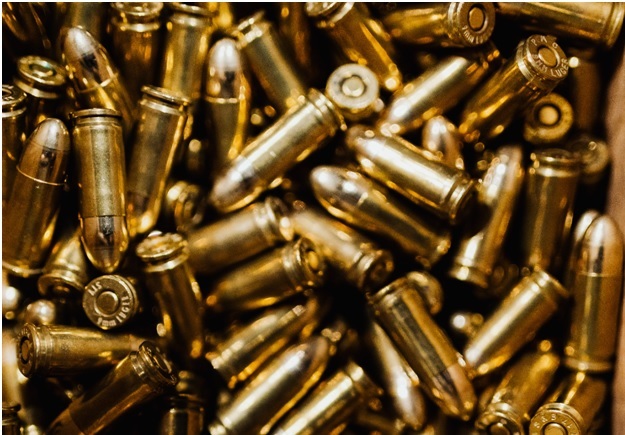Recoil sensitivity is a big deal, especially for first-time gun owners. You want to make sure you are fully aware of what you’re getting into before you buy your first gun because it can represent a substantial investment and you don’t want to end up with something you hate.
There is no substitute for experience. Get to a range with an experienced shooter friend or relative and learn which handgun ammunition cartridges are good for you and which are not before you buy anything.
All the same, you need to know where to start. If you’ve never fired a gun before in your life, you don’t want your first experience to be with a light revolver chambered in .44 Magnum or 10mm Auto.
So, with that in mind, here are 5 (pretty) great cartridges for recoil-sensitive shooters.
.22 LR

The .22LR, one of the most ubiquitous cartridges in the world which is paired with both rifles and handguns, is a light-shooting round no matter how you slice it.
Obviously, recoil varies according to gun weight, action type, and load data - but even when fired from a lightweight revolver with an aluminum frame, .22LR just doesn’t produce much recoil.
Fire it from a semi-automatic rifle and recoil is literally nonexistent.
If you are very small-framed or don’t handle recoil well and you’re interested in getting your first gun for plinking or target shooting, .22LR comes highly recommended.
It is affordable, usually very widely available, and you can shoot it all day long, and your shoulder or wrists will never even feel it.
.380 Auto
The .380 Auto is one of the lightest kicking centerfire pistol cartridges of them all, and if you are recoil sensitive, you can hardly do better if you need more power than the .22LR can deliver.
Muzzle energies for .380 Auto cartridges vary according to load data but generally waver between 190 to 300 or so ft-lbs. That’s pretty light, all things considered, and makes controlling a handgun chambered in .380 Auto fairly easy.
Revolvers will kick harder, but if you get a semi-auto, that will help with recoil a bit. Just remember that some consider .380 Auto slightly underpowered for self-defense.
.38 Special
Looking at the .38 Special cartridge, which is substantially longer than the 9mm (although basically the same diameter) you might be thinking, “that cartridge has to kick a lot harder.”
Well, it really doesn’t. Bullet size is about the same, and .38 Special loads produce a lot less internal pressure, which means 9mm loads are usually a lot hotter.
The result? The .38 Special is actually usually a fairly light-kicking cartridge, as handgun cartridges go.
Just remember - a light-framed revolver in .38 Special is going to kick hard. Heavier revolvers and semi-automatic pistols in this caliber will shoot a lot more smoothly and produce less recoil.
9mm (Specifically, Federal 9mm 115 Grain)

All in all, the 9mm cartridge is not a particularly hard-kicking round. This is great news, since the cartridge generally offers great stopping power, making it excellent for self-defense.
However, lighter loads, like the Federal 9mm 115-grain target loads we sell here, don’t kick quite as hard as some heavier 124-grain or even 147-grain 9mm loads.
These Federal 9mm 115-grain loads produce 356 ft-lbs of energy at the muzzle, so in heavier guns, they should kick only a little bit harder than the hottest .38 Auto rounds, which is surprising.
.40 S&W
Hopefully, we don’t get any flak for saying this, but some might consider the .40 S&W a fairly light-kicking load.
Now, to be clear, the .40 S&W kicks a lot harder than 9mm, and way, way harder than the other loads mentioned here, but it still produces a lot less recoil than the rounds to follow (see below).
So, if you need a cartridge that produces better stopping power than common 9mm loads, but you don’t want to torment your wrists, the .40 S&W might just be an excellent choice.
Calibers to Avoid (for Recoil-Sensitive Shooters)
Now that we’ve covered some cartridges that are a good choice for recoil-sensitive shooters, let’s cover some of the ones you should definitely avoid if you are not a fan of recoil.
If you’re recoil sensitive, pass right on by:
- .44 Remington Magnum
- 10mm Auto
- .45 ACP
There are other more extreme handgun calibers that are also not suitable for recoil-sensitive shooters, such as .454 Casull, .500 S&W Mag, and .460 S&W Mag, but these are not as common as the three mentioned above.
Gun Kicking Harder than You’d Like? Get a Compensator
One final tip we have for you if you want to be able to shoot a handgun chambered in a heavier caliber is to install a compensator.
If your handgun has a threaded barrel or can otherwise accept a compensator, these muzzle devices will alter the manner in which gases are ported at the muzzle - generally shifting them upwards.
This forces the muzzle down, which helps combat muzzle flip, and also lessens the forces of felt recoil - in some cases, by up to 50%. It also does not affect shot power.
So, if you love your handgun but don’t love the kick, consult a local gunsmith to see what your options are.

